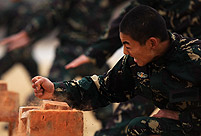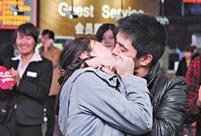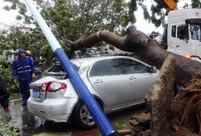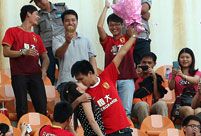 |
| Illustration: Chen Xia/GT |
It's not uncommon for doctors to make headlines for performing lifesaving surgery or making breakthroughs in medical research that will benefit humankind. But recent news about doctors in China has not been positive. Medical staff have become victims of violent assaults, sometimes fatal, carried out by patients and their families.
This week pictures of doctors and nurses learning and practicing taekwondo and other self-defense skills at two prominent hospitals in Shanghai drew further public attention to the long-running issue. This is just the latest action implemented following a series of hospital-patient disputes nationwide.
On October 17, an intensive care unit in Shanghai's Shuguang Hospital was smashed and destroyed by the angry family members of a patient.
On October 25, a doctor in First People's Hospital of Wenling in neighboring Zhejiang Province was stabbed and killed by a disgruntled patient who had undergone unsuccessful surgery on his nose in March 2012. Another two doctors were also injured in the attack.
The shocking incident sparked reaction across the country and even drew media attention worldwide.
In the following days, medical staff in Wenling and other cities in Zhejiang gathered in local squares to mourn the deceased doctor and protest violence targeting doctors. On the day of the doctor's funeral, mourning activities nationwide were organized by various medical organizations for people to express their condolences to the doctor's family and their anger toward the attackers.
Hundreds of doctors from Shanghai's Zhongshan Hospital gathered in front of the statue of Sun Yat-sen, after whom the hospital was named, to mourn over the death of their peer in Zhejiang. Some said that conditions are so bad for doctors that they need psychological counseling.
As it turns out, being granted permission to express their emotions publicly was more than what some doctors in Shanghai were allowed. According to anonymous sources, doctors at another major hospital were informed the day before that they would not be allowed to participate in a similar rally in order to maintain stability and harmony at the hospital. In the message, the hospital management warned of possible disciplinary punishment if any staff disobeyed the directive.
We can only imagine how disappointed the doctors at the latter hospital felt.
The different responses of the management at Shanghai's hospitals reflect the difficulties medical staff are currently facing.
A doctor friend told me that quite a number of physicians live with stress. Media reports about extreme examples of corrupt doctors have tarnished the reputation of the profession as a whole and created general public distrust toward hospitals. Doctors are scorned as hongbao receivers, pharmaceutical kickback takers and criticized for being indifferent toward patients. Hospital-patient relations have deteriorated to a very poor level.
My friend told me that with or without hongbao, doctors try their best to save or cure a patient. But the friend also admitted that many doctors are not firm enough to reject hongbao.
At the same time, recent reform of the public health system which encourages hospitals to support themselves through drug sales also plays a negative role in burdening patients, who then direct their discontent and anger at the doctors who treat them. To some extent, doctors are scapegoats of a flawed medical system.
It's therefore understandable that hospitals have organized self-defense classes for staff. Although the burden shouldn't fall on them, unfortunately, doctors are increasingly feeling the need to know how to protect themselves.
Survival tips online recommend that doctors don't leave their back to the door, and, if there is potential trouble, doctors should remove their white lab coats and hide amongst a crowd.
Being a doctor is a respectable and decent career. Only the best and brightest can shoulder the responsibility of healing the wounded and rescuing the dying. Even when a procedure fails or a patient dies - as is sometimes unavoidable - doctors still deserve respect for trying to help others. If being a doctor becomes an unfavorable career choice and elite talents spurn the profession, who will treat us when we are ill? Disgruntled patients should not bite the hand that heals.
What can be done to restore the public's faith in our physicians? Structurally speaking, a good environment is needed to guarantee that doctors can concentrate on medical research and practice. Their income level should match their efforts and expertise. Their earnings shouldn't be tied to the amount of drugs they prescribe. At the same time, doctors ought to practice strict self-discipline when it comes to hongbao or kickbacks.
The media also shouldn't focus solely on negative stories while neglecting the majority of positive cases.
Finally, the general public must be understanding of the pressures and challenges medical staff face and realize that they cannot cure every ailment.
 Luxury-cars parade held in Dubai
Luxury-cars parade held in Dubai Special forces take tough training sessions
Special forces take tough training sessions Fire guts 22-storey Nigeria commercial building in Lagos
Fire guts 22-storey Nigeria commercial building in Lagos Singles Day:
Singles Day:  Temperature drops dramatically in Beijing
Temperature drops dramatically in Beijing Typhoon Haiyan hits south China's Hainan
Typhoon Haiyan hits south China's Hainan Top 10 celebrity moms in China
Top 10 celebrity moms in China Weekly Sports Photos:
Weekly Sports Photos: Gingko leaves turn brilliant golden yellow in Beijing
Gingko leaves turn brilliant golden yellow in Beijing Maritime counter-terrorism drill
Maritime counter-terrorism drill Love searching stories in cities
Love searching stories in cities Living in an urban village: 'Iron-digger' Xiong Sansan
Living in an urban village: 'Iron-digger' Xiong Sansan China in autumn: Kingdom of red and golden
China in autumn: Kingdom of red and golden National Geographic Traveler Photo Contest
National Geographic Traveler Photo Contest Weekly Sports Photos
Weekly Sports PhotosDay|Week|Month